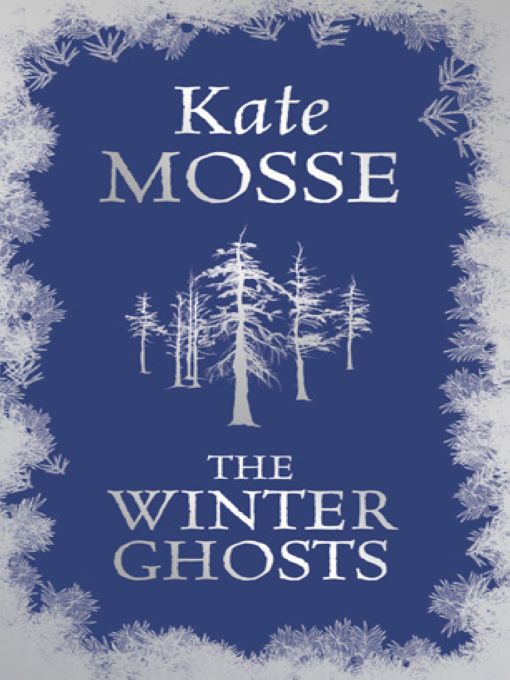The Winter Ghosts
Authors: Kate Mosse

Table of Contents
ALSO BY KATE MOSSE
Fiction
Sepulchre
Labyrinth
Crucifix Lane
Eskimo Kissing
Non-Fiction
The House: Behind the Scenes at the Royal Opera House, Covent Garden
Becoming a Mother
The Winter Ghosts
KATE MOSSE
Orion
First published in Great Britain in 2009 by Orion Books, an imprint of The Orion Publishing Group Ltd
Orion House, 5 Upper Saint Martin’s Lane
London WC2H 9EA
An Hachette UK Company
1 3 5 7 9 10 8 6 4 2
Copyright © Mosse Associates Ltd 2009
Translation of Occitan song © Mosse Associates Ltd 2009
Illustrations © Brian Gallagher
The moral right of Kate Mosse to be identified as the author of this work has been asserted in accordance with the Copyright, Designs and Patents Act of 1988.
All rights reserved. No part of this publication may be reproduced, stored in a retrieval system, or transmitted in any form or by any means, electronic, mechanical, photocopying, recording, or otherwise, without the prior permission of both the copyright owner and the above publisher of this book.
All the characters in this book are fictitious, and any resemblance to actual persons living or dead is purely coincidental.
A CIP catalogue record for this book is available from the British Library.
eISBN : 978 1 4091 1229 7
ISBN (Trade paperback) 978 1 4091 1562 5
Printed in Great Britain by
Clays Ltd, St Ives plc
The Orion Publishing Group’s policy is to use papers that are natural, renewable and recyclable products and made from wood grown in sustainable forests. The logging and manufacturing processes are expected to conform to the environmental regulations of the country of origin.
‘Known unto God’
Rudyard Kipling
(epigraph carved on the tombstones raised to the memory of unknown soldiers and airmen)

Lo Vièlh Ivèrn
Lo vièlh Ivèrn ambe sa samba ranca
Ara es tornat dins los nòstres camins
Le nèu retrais una flassada blanca
E’l Cerç bronzís dins las brancas dels pins.
Ara es tornat dins los nòstres camins
Le nèu retrais una flassada blanca
E’l Cerç bronzís dins las brancas dels pins.
Old Winter
Pitiful old Winter has returned,
Limping up and down our roads,
Spreading his white blanket of snow
While the Cers wind cries in the
branches of the pine trees.
Limping up and down our roads,
Spreading his white blanket of snow
While the Cers wind cries in the
branches of the pine trees.
Traditional Occitan Song
TOULOUSE
April 1933


He walked like a man recently returned to the world. Every step was careful, deliberate. Every step to be relished.
He was tall and clean-shaven, a little thin perhaps. Dressed by Savile Row. A light woollen suit of herringbone weave, the jacket wide on the shoulders and narrow at the waist. His fawn gloves matched his trilby. He looked like an Englishman, secure in his right to be on such a street on such a pleasant afternoon in spring.
But nothing is as it seems.
For every step was a little too careful, a little too deliberate, as if he was unwilling to take even the ground beneath his feet entirely for granted. And as he walked, his clever, quick eyes darted from side to side, as if he were determined to record every tiny detail.
Toulouse was considered one of the most beautiful cities in the south of France. Certainly, Freddie admired it. The elegance of its nineteenth-century buildings, the medieval past that slept beneath the pavements and colonnades, the bell towers and cloisters of Saint-Etienne, the bold river dividing the city in two. The pink brick facades, blushing in the April sunshine, gave Toulouse its affectionate nickname,
la ville rose
. Little had changed since Freddie had last visited, at the tail end of the 1920s. He had been another man then, a tattered man, worn threadbare by grief.
la ville rose
. Little had changed since Freddie had last visited, at the tail end of the 1920s. He had been another man then, a tattered man, worn threadbare by grief.
Things were different now.
In his right hand, Freddie carried directions scribbled on the back of a napkin from Bibent, where he’d lunched on filet mignon and a blowsy Bordeaux. In his left-hand breast pocket was a letter patterned with antiquity and dust, secure in a pasteboard wallet. It was this - and the fact that, at last, he had the opportunity to return - which brought him back to Toulouse today. The mountains where he’d come across the document held a strong significance for him, and though he had never read the letter, it was a precious possession.
Freddie crossed the Place du Capitole, heading towards the cathedral of Saint-Sernin. He walked through a network of small streets, obtuse little alleyways filled with jazz bars and poetry cellars and gloomy restaurants. He sidestepped couples on the pavements, lovers and families and friends out enjoying the warm afternoon. He passed through tiny squares and hidden
ruelles
, and along the rue du Taur, until he reached the street he was looking for. Freddie hesitated at the corner, as if having second thoughts. Then he continued on, walking briskly now, dragging his shadow behind him.
ruelles
, and along the rue du Taur, until he reached the street he was looking for. Freddie hesitated at the corner, as if having second thoughts. Then he continued on, walking briskly now, dragging his shadow behind him.
Halfway along the rue des Pénitents Gris was a
librairie
and antiquarian bookseller. His destination. He stopped dead to read the name of the proprietor painted in black lettering above the door. Momentarily, his silhouette was imprinted on the building. Then he shifted position and the window was once more flooded with gentle sunlight, causing the metal grille to glint.
librairie
and antiquarian bookseller. His destination. He stopped dead to read the name of the proprietor painted in black lettering above the door. Momentarily, his silhouette was imprinted on the building. Then he shifted position and the window was once more flooded with gentle sunlight, causing the metal grille to glint.
Freddie stared at the display for a moment, at the antique volumes embossed with gold leaf, and the highly polished leather slip casings of black and red, at the ridged spines of works by Montaigne and Anatole France and Maupassant. Other, less familiar names, too: Antonin Gadal and Félix Garrigou; and volumes of ghost stories by Blackwood and James and Sheridan Le Fanu.
‘Now or never,’ he said.
The old-fashioned handle was stiff and the door dug in its heels as Freddie pushed it open. A brass bell rattled somewhere distant at the back of the shop. The coarse rush matting sighed beneath the soles of his shoes as he stepped in.
‘
Il y a quelqu’un
?’ he said in clipped French. ‘Anybody about?’
Il y a quelqu’un
?’ he said in clipped French. ‘Anybody about?’
The contrast between the brightness outside and the patchwork of shadows within made Freddie blink. But there was a pleasing smell of dust and afternoons, glue and paper and polished wooden shelves. Particles of dust danced in and out of the beams of slatted sunlight. He was sure now that he had come to the right place and he felt something unwind inside him. Relief that he had finally made it here, perhaps, or of being at his journey’s end.
Freddie took off his hat and gloves and placed them on the long wooden counter. Then he reached into the pocket of his suit jacket and brought out the small pasteboard wallet.
‘Hello?’ he called a second time. ‘Monsieur Saurat?’
He heard footsteps, then the creak of a small door at the back of the shop, and a man walked through. Freddie’s first impression was of flesh; rolls of skin at the neck and wrists, a smooth and unlined face beneath a shock of white hair. He did not, in any way, look like the medieval scholar Freddie was expecting.

‘Monsieur Saurat?’
The man nodded. Cautious, bored, uninterested in a casual caller.
‘I need help with a translation,’ Freddie said. ‘I was told you might be the man for such a job.’
Keeping his eyes on Saurat, Freddie carefully slipped the letter from its casing. It was a heavy weave, the colour of dirty chalk, not paper at all, but something far older. The handwriting was uneven and scratched.
Saurat let his gaze slip to it. Freddie watched his eyes sharpen, first with surprise, then astonishment. Then greed.
‘May I?’
‘May 1?’
‘Be my guest.’
Taking a pair of half-moon spectacles from his top pocket, Saurat perched them on the end of his nose. He produced a pair of thin, linen gloves from beneath the counter, pulled them on. Holding the letter gently at the corner between forefinger and thumb, he held it up to the light.
‘Parchment. Probably late medieval.’
‘Quite right.’
‘Written in Occitan, the old language of this region.’
‘Yes.’ All this Freddie knew.
Saurat gave him a hard look, then dropped his eyes back to the letter. An intake of breath, then he began to read the opening lines aloud. His voice was surprisingly light.
Other books
Barnstorm by Page, Wayne;
The Lucky Ones by Stephanie Greene
The Pirate Next Door by Jennifer Ashley
The Sunday Hangman by James Mcclure
Drift (Drift Series) by Dean, Michael
Our Honored Dead (Stephanie Chalice Thrillers Book 4) by Lawrence Kelter
Black Knight, White Queen by Jackie Ashenden
Bad Things by Michael Marshall
Alpha Male by Cooley, Mike